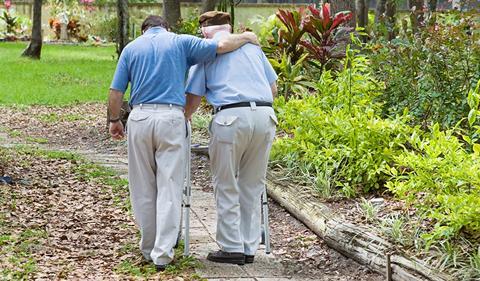NeuroCoRe’s ACEmobile Dementia Assessment App supports non-specialist staff to reliably assess cognitive impairment and won the 2018 HSJ Awards for Using Technology to Improve Efficiency. Emma Dent reports

Prompt dementia assessment is a national priority. According to the Alzheimer’s Society, some 800,000 people in the UK have dementia; one in three people over the age of 65 will develop the condition and the number of people with dementia will double over the next 40 years.
In addition to a significant cost to quality of life, dementia costs the UK £28 billion a year.
The burden for diagnosing dementia has fallen to NHS memory clinics, where the subsequent increase in demand has led to clinical pressures and increased waiting times. It has also led to an increase in non-specialist clinicians including junior nurses, GPs and mental health nurses undertaking assessments, of which a cognitive assessment is a key part, alongside a relevant history and observed change in functioning.
A need to improve available data in this area is an added demand. The project team behind NeuroCoRe felt a response was needed after an NHS audit that found 78 per cent of dementia assessments using a primary cognition tool were significantly error prone, due to human error, even across assessments undertaken by a range of specialists.
Developed by the Peninsula Schools of Medicine and Dentistry, University of Plymouth and University Hospitals Plymouth Trust, The Neuro-Cognitive Research Centre – NeuroCoRe – developed the award winning ACEmobile, a dementia assessment app.
Identify rate of error
The app seeks to both identify the rate of error in NHS memory clinics when assessing dementia related cognitive impairment and support the ability of non-specialist staff to reliably assess cognitive impairment, while reducing the time and resources taken to do so.
It assesses memory, language (specifically naming), visuospatial ability, praxis and executive functioning in a platform that aims to collect more sensitive and individualised data than can be collected using traditional neuro-psychological measures.
NeuroCoRe lead, mHealth innovation lead and senior research fellow at Peninsula Schools of Medicine and Dentistry and a clinical psychologist at University Hospitals Plymouth Trust, Dr Craig Newman says winning the HSJ Award was “very validating”.
The potential to receive a rapid diagnosis in a doctor’s surgery was game-changing, as was the altruism of the team behind the initiative – given this could have easily become a commercial proposition
Dr Newman continues: “We built this out of enthusiasm on top of our day jobs and although we were supported by the generosity of our organisations it has been a lot of hard work. It has never had a marketing budget; its reputation has spread by reputation and word of mouth and is now well established. The HSJ Awards are such a massive competition that it was very valuable for us to have that recognition. It was a real morale boost.”
Initially available in the UK and Australia, on iPads, the ACEmobile app is now available worldwide and will be launched on Android this year.
NeuroCoRe is a not for profit enterprise; Dr Newman explains that while the decision is questioned by others, keeping the app as a free resource was important to its development team.
“We did not do this with an intention to make money but to make a helpful resource. It was a moral decision not to commercialise it and to keep it free. I am one of a handful of NHS innovation leads that have not commercialised our innovation, but we wanted to be able to help improve the NHS at no cost to the NHS,” he says.
“But there is a certain amount of suspicion about things that are free in the NHS, which is a system where everything is purchased. It can be difficult for anything free to enter such a system as it can be seen to have no value. Even the judging panel were confused about why we have not commercialised it, especially as none of our competitors are free.”
Despite this Dr Newman says the judging process was beneficial.
“The judging was very valuable experience; there is a lot of constructive criticism and both that and the questions at the end of the judging process were very helpful. That is not something I have experienced before, while undergoing judging in other awards.”
Andrew Preston, chief executive of GRI, says the Using Technology to Improve Efficiency category was a natural fit for GRI as a sponsor organisation.
“As a business that prides itself on delivering technology to transform the costs and administrative burdens of agency recruitment in the NHS, we are absolute champions of the power of technology,” he says. “During the judging it was refreshing to see the sheer scale of research and innovation that is happening across the UK from primary care through to secondary.”
Mr Preston says the NeuroCoRe project stood out because of its “incredibly clear benefits to patients and sheer impact. The potential to receive a rapid diagnosis in a doctor’s surgery was game-changing, as was the altruism of the team behind the initiative – given this could have easily become a commercial proposition.”
For more information on NeuroCoRe’s winning entry visit HSJ Solutions
The 2019 HSJ Awards are now open for entries. For more information on the Driving Efficiency through Technology category visit https://awards.hsj.co.uk/categories






















